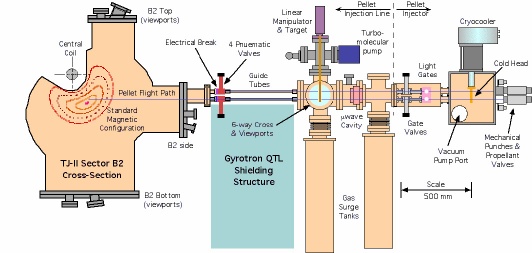TJ-II:Pellet injector: Difference between revisions
No edit summary |
No edit summary |
||
| Line 15: | Line 15: | ||
Finally, the system is completed by stand-alone instrumentation | Finally, the system is completed by stand-alone instrumentation | ||
and controls, as well as LabView controlled gas manifolds. | and controls, as well as LabView controlled gas manifolds. | ||
<ref>[http:// | <ref>[http://dx.doi.org/10.1109/FUSION.2005.252922 K.J.McCarthy, ''A compact flexible pellet injector for the TJ-II stellarator'', Proc. 21<sup>st</sup> IEEE/NPSS Symposium on Fusion Engineering 2005 (SOFE05)]</ref> | ||
[[File:TJ-II_pellet_injector.jpg|532px|thumb|centre|Diagram of the TJ-II pellet injector]] | [[File:TJ-II_pellet_injector.jpg|532px|thumb|centre|Diagram of the TJ-II pellet injector]] | ||
Revision as of 09:01, 5 August 2009
A compact multi-barrel pellet injector system is being developed for the TJ-II stellarator. Its design is based on the system currently installed at the MST facility (Univ. Winconsin) and will provide maximum flexibility at minimal cost, while also allowing for future upgrades. It is a four-barrel system destined for use both as an active plasma diagnostic and as a plasma fueling source. In order to achieve both objectives it will be sufficiently flexible to allow frozen hydrogen pellets with diameters from 0.4 to 1 mm to be formed and accelerated to velocities between 100 and 1000 m s-1. However, floor space restrictions and nearest-neighbor considerations limits the overall length to <1.7 m (mechanical punch end to final guide tube interfaces). This will be done by redesigns of the MST gun barrel, vacuum coupling, gas dump and guide tube sectors. Finally, the system is completed by stand-alone instrumentation and controls, as well as LabView controlled gas manifolds. [1]
